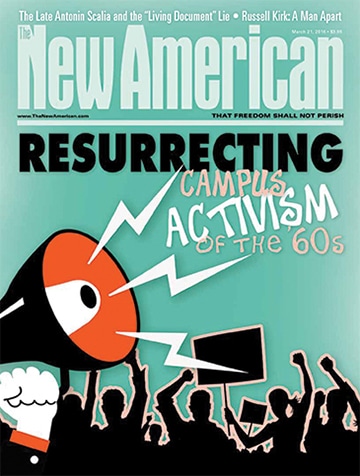U.K. “Brexit” Vote and “Project Fear”
British voters have the global establishment in a tizzy. Not only are the leaders of the U.K.’s Conservative, Labour, and Liberal Democrat parties all in a lather at the possibility that voters, in the June 23 national referendum, may opt for Britain to exit the European Union (a move dubbed “Brexit”), but so too are leaders at other globalist institutions: the White House, United Nations, IMF, G20, G8, central bankers, EU Commission and Parliament, Council on Foreign Relations (CFR), European Council on Foreign Relations (ECFR), Brookings Institution, Royal Institute for International Affairs, Peterson Institute for International Economics, Wall Street moguls, tech company titans, the New York Times — and on and on.
The Brexit movement, which is being organized chiefly by the United Kingdom Independence Party (UKIP), has been under concerted attack by the organized one-worlders for the past couple of years. But since Prime Minister David Cameron’s announcement in February that Brits would have the opportunity to vote on the matter in June, the globalizers have really come unglued.
Why this is so is hardly a mystery. A British exit, if not a death-blow, would certainly count as a near-knockout punch to the already struggling EU. Not only would a Brexit stand as the biggest reversal in the history of “the Project” — as the globalist architects cryptically refer to their decades-long scheme of centralization and concentration of power on the continent — but they know full well it would inspire others to exit as well, or at least to demand greater autonomy from the EU’s authoritarian cabal in Brussels. Already there is talk of a possible “Czexit” movement in the Czech Republic. It could also revive the “Grexit” in Greece. Hungarian Prime Minister Viktor Orban announced on February 24 that his country will defy the EU’s mandate on accepting refugee quotas and hold a national plebiscite on migration. The previous day, the foreign and interior ministers of Austria and nine Balkan members of the EU met in Vienna and issued a declaration challenging the EU’s authority to interfere in their vital internal affairs, as they relate to the current migration crisis.
“It is not possible to process unlimited numbers of migrants and applicants for asylum,” they said, also citing “limited resources and reception capacities, potential consequences for internal security and social cohesion, as well as challenges with regard to integration.” They insist on enforcing their own border security and establishing their own criteria concerning which “refugees” qualify for asylum.
Back in 2013, when serious talk of a Brexit was getting started, President Obama waded into the matter. The White House press office said that in a personal call to Cameron, “the President underscored our close alliance with the United Kingdom and said that the United States values a strong UK in a strong European Union, which makes critical contributions to peace, prosperity, and security in Europe and around the world.”
At that time, migration issues were already a serious concern for many British voters, but financial concerns — unemployment, economic malaise, bank bailouts, and EU regulations and mandates — seemed to dominate the EU in-out debate, which was much less fervent than at present. The magnitude of the migration crisis over the past year has catapulted the matter to a political front-burner issue. Cameron, who is committed to the EU’s “ever-closer union,” has been forced (after much stalling and false promising) to hold the referendum. However, he has launched a massive media campaign that his opponents have dubbed “Project Fear,” aimed to scare Brits into voting against the Brexit. “British voters will never love the European Union. But maybe they can be terrified into voting not to leave it,” Politico noted on February 26, reporting, “In speeches and interviews, David Cameron and his allies bluntly warned of shock to the economy and the job market and terrorist attacks if Britain leaves.”
Among those joining in the “Project Fear” campaign are IMF managing director Christine Lagarde, the G20 finance ministers and central bankers, billionaire playboy and Virgin Group CEO Richard Branson, top advisor to the PIMCO-Allianz investment behemoth Mohammed El-Erian, the Big 3 credit rating agencies (Moody’s, Fitch, and S&P) — whose collusion and fraudulent accounting gave us the 2008 financial crisis and Wall Street bailouts — and Council on Foreign Relations President Richard Haass (and many other CFR members). Helping direct the effort are former Obama campaign strategists Jim Messina and Tara Corrigan.
Despite this formidable array, the anti-EU movement is gaining force. Among the prominent Brits who have come out in favor of the Brexit campaign are six of Cameron’s Cabinet ministers — Michael Gove, Iain Duncan Smith, Chris Grayling, Theresa Villiers, John Whittingdale, and Priti Patel — as well as Boris Johnson, the popular mayor of London, who is seen by many as a Conservative Party replacement for Cameron at No. 10 Downing Street. The upcoming Brexit vote will be of crucial importance for Britain, EU, the United States, and the world.


